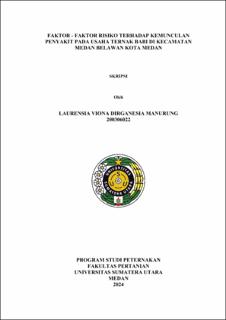| dc.description.abstract | In Medan City, pigs are one of the commodities that have been reported
with many cases of sudden death due to outbreaks of disease viruses, so it is
necessary to identify risk factors that have the potential to play a role in the
emergence and transmission of disease viruses in pigs in Medan Belawan District
so that farmers are expected to take preventive measures against risk factors that
have the potential to be sources of disease transmission. Several risk factors for
the emergence of disease in pig farming businesses are pen management,
biosecurity management, waste management, disease prevention systems,
sanitation and disinfection, and carcass disposal systems. This study aims to see
how much influence each factor of pen management, biosecurity management,
waste management, disease prevention systems, sanitation and disinfection, and
carcass disposal systems has on the risk of disease emergence in pig farming
businesses. This research is a quantitative research that uses non-probability
sampling with purposive sampling technique. The number of samples used is 70
farmers from 3 sub-districts in Medan Belawan District, namely: Bagan Deli
Village, Belawan Bahagia Village and Belawan Sicanang Village. The criteria for
the sample include: the business is privately owned, farmers have at least 5 adult
pigs, and have a minimum of 5 years of business experience. The instrument test
used is the validity and reliability test. The research model used is a multiple
linear regression model with the help of Ms. Excel and SPSS 29. The results of
this study are that pen management partially has a positive effect on the risk of
disease emergence in pig farming businesses, with a t-value of 2.258 and a sig.
value of 0.028, Biosecurity management partially has a positive effect, with a tvalue
of 7.526 and a sig. value <,001, Waste processing partially has a positive
effect, with a t-value of 2.390 and a sig. value. 0.017, partial disease prevention
has a positive effect, with a t-value of 2.453 and a sig. value of 0.031, partial
sanitation and disinfection have a positive effect, with a t-value of 5.047 and a sig.
value <0.001, the carcass disposal system partially does not have a significant
effect on the risk of disease emergence in pig farming, with a t-value of -0.733 and
a sig. value of 0.466. The results of the simultaneous statistical test, the overall
variable data has a significance value of <,001 <0.05, so it can be concluded that
partially the independent variables as a whole | en_US |


